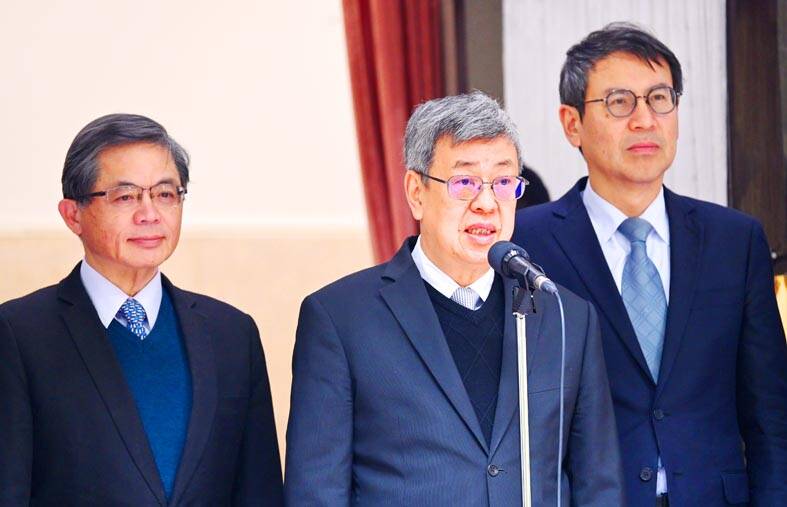Opposition parties have been pushing for absentee voting after a presidential election that had the second-lowest turnout in history, but Premier Chen Chien-jen (陳建仁) said the government has no plans to adopt the practice.
In Taiwan, voters, with a few exceptions, must cast their ballots on election day in the area in which their households are registered, meaning citizens living abroad or other than where they are registered have to travel to vote. No early voting, drop-boxes or mail-in voting is offered.
Asked about absentee voting before a legislative hearing on Tuesday, Chen said that voting is a citizen’s right that is protected by the Constitution and other laws.

Photo: Liu Hsin-de, Taipei Times
However, for absentee voting to become a reality, election systems would need to be strengthened, and planning and research would be required to ensure that votes are kept confidential and election results are accurate and fair, he said.
“The Cabinet does not have any plans for this at this time,” he said.
Minister of the Interior Lin Yu-chang (林右昌) agreed, saying that absentee voting involves many considerations.
Under the existing circumstances, it would not be suitable for regular elections, but could be used for referendums, he said, not explaining why.
The Cabinet last month approved a draft bill to allow absentee voting for referendums for people unable or unwilling to return to the city or county in which they are registered.
However, the measure would not apply to people living overseas.
Central Election Committee Vice Chairman Chen Chao-chien (陳朝建) at the time said that absentee voting should first be permitted for national referendums, and once stable procedures and social trust are established, that experience could be applied to elections.
Chinese Nationalist Party (KMT) lawmakers had proposed that the measure be extended to presidential elections and include mail-in ballots and provisions for overseas citizens to vote.
Democratic Progressive Party (DPP) lawmakers said the KMT proposal might risk interference by Beijing in Taiwan’s elections, as many Taiwanese live and work in China.
KMT Chairman Eric Chu (朱立倫) on Tuesday said that the DPP was simply rehashing its usual talking points while denying millions of people their right to vote.
More than 100 countries have absentee voting systems, including Japan, Philippines, South Korea and even the US, which has a fierce rivalry with China, he said.
The turnout for the Jan. 13 presidential election was 71.68 percent, the second-lowest in history after the 66.27 percent turnout recorded in 2016. The highest turnout for a presidential election was 82.69 percent in 2000, but it has steadily declined since then.

Costa Rica sent a group of intelligence officials to Taiwan for a short-term training program, the first time the Central American country has done so since the countries ended official diplomatic relations in 2007, a Costa Rican media outlet reported last week. Five officials from the Costa Rican Directorate of Intelligence and Security last month spent 23 days in Taipei undergoing a series of training sessions focused on national security, La Nacion reported on Friday, quoting unnamed sources. The Costa Rican government has not confirmed the report. The Chinese embassy in Costa Rica protested the news, saying in a statement issued the same

Temperatures in New Taipei City’s Sindian District (新店) climbed past 37°C yesterday, as the Central Weather Administration (CWA) issued heat alerts for 16 municipalities, warning the public of intense heat expected across Taiwan. The hottest location in Taiwan was in Sindian, where the mercury reached 37.5°C at about 2pm, according to CWA data. Taipei’s Shilin District (士林) recorded a temperature of 37.4°C at noon, Taitung County’s Jinfeng Township (金峰) at 12:50 pm logged a temperature of 37.4°C and Miaoli County’s Toufen Township (頭份) reached 36.7°C at 11:40am, the CWA said. The weather agency yesterday issued a yellow level information notice for Taipei, New

Taiwan’s Liu Ming-i, right, who also goes by the name Ray Liu, poses with a Chinese Taipei flag after winning the gold medal in the men’s physique 170cm competition at the International Fitness and Bodybuilding Federation Asian Championship in Ajman, United Arab Emirates, yesterday.

A year-long renovation of Taipei’s Bangka Park (艋舺公園) began yesterday, as city workers fenced off the site and cleared out belongings left by homeless residents who had been living there. Despite protests from displaced residents, a city official defended the government’s relocation efforts, saying transitional housing has been offered. The renovation of the park in Taipei’s Wanhua District (萬華), near Longshan Temple (龍山寺), began at 9am yesterday, as about 20 homeless people packed their belongings and left after being asked to move by city personnel. Among them was a 90-year-old woman surnamed Wang (王), who last week said that she had no plans